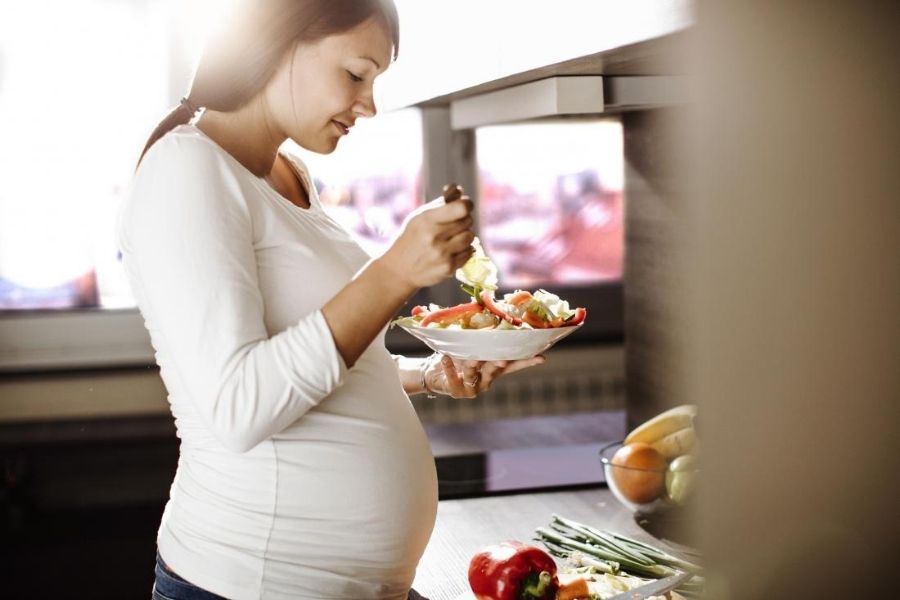Pregnancy is the most exciting period in a woman’s life as she experiences infinite emotions together. It is also a crucial period that requires constant care and healthy choices to have a healthy pregnancy. But it also comes with exciting myths and facts. Let’s discuss the myths and facts during pregnancy and clarify all the doubts.
Myths And Facts During Pregnancy
1. Pregnancy Means You Need To Eat For The Two.

How can an adult woman’s dietary requirement be similar to the requirement for a 3 kg baby? So this is a myth that the woman should eat for the two during pregnancy. The calorie requirement increases by 20% during pregnancy and in the last three to four months. The increased need for iron, calcium, proteins, and vitamins should also be fulfilled with calories. For this, ‘what to eat’ is more important than ‘how much to eat.’
2. Eating Sweets And Extra Ghee/Butter In Moderate Quantities During Pregnancy.

In Indian families, once the woman becomes pregnant, everyone starts pampering her a lot. And the usual method to pamper is to make her eat lots of sweets, ghee, and butter to make the baby healthy and chubby and also for the sake of normal delivery. There is a chance of significantly increased mother and baby weight due to the excessive intake of sweets, ghee, and butter. In this case, the chances of normal delivery might also decrease.
3. Avoid Eating Outside Packed Foods During Pregnancy.

Pregnancy women tend to eat lots of outside packed food items (chaat, chocolates, chips, etc.) during pregnancy. It can lead to a significant increase in her weight, and it also increases the risk of stomach infections. Higher sodium content in chips and other packed food items can increase blood pressure during pregnancy. Also, ajino-moto in Chinese foods, artificial colors, sugar in chocolates, and caffeine can be harmful to the growing baby.
4. Intaking Non-vegetarian Foods To Be Stopped During Pregnancy.

Many pregnant women stop eating non-veg foods during pregnancy. Non-veg foods provide good quality proteins in a reasonable quantity, essential for a baby’s growth. Non-vegetarians can have homemade non-veg foods (chicken, fish, eggs) in fewer amounts but regularly. Vegetarians should include milk, curd, cheese, paneer in their diet to get good quality proteins.
5. Drinking Coffee, Tea, Or Soft Drinks During Pregnancy.

Tea and coffee have caffeine and tannin content in it, respectively. Significantly higher intake of caffeine increases the risk of abortion. Tannin hinders the absorption of iron, decreasing the appetite. A pregnant woman doesn’t get any vital nutrients through these beverages. Also, there is an increased intake of sugar through these beverages. Cold drinks contain soda, artificial colors, and lots of sugar. Not only a pregnant woman but all other people should also avoid having cold drinks.
6. Ignore The Weight Gain During Pregnancy.

In many pregnant women, there is a significant amount of weight gain during pregnancy. It is because of bad eating habits and a myth that exercise should be avoided during pregnancy. The ideal weight gain for a healthy weight woman should be 8-10 kg in the whole pregnancy. 1 kg in the first three months, 3-4 kg in the next three months, and 5-6 kg weight gain in the last three months of pregnancy.
In the case of overweight women from before pregnancy, this much weight gain is not recommended. So, consult your doctor for recommended weight gain and exercises during pregnancy. Excessive weight gain during pregnancy increases the risk of diabetes, high blood pressure. It can also cause problems during the delivery. To avoid all this, concentrate on the weight gain from the 1st month only. In case of higher or lower weight gain, consult your nutritionist.
7. Taking Supplements/Protein Powders Without Consulting The Doctor/Nutritionist.

Referring to the various advertisements on supplements and protein powders, they are not required to take. They don’t help but can cause harm during pregnancy. Don’t take any supplements without consulting the doctor or nutritionist. If required, they will prescribe the dose of supplements.
Mothers should follow exclusive breastfeeding for the first six months. Mother’s breast milk is the only and the healthiest food for the baby. Breastfeeding has a lot of importance in the early 1000 days of the life of a baby.
Read Also: Yoga For Pregnant Women








1 thought on “7 Myths And Facts During Pregnancy”